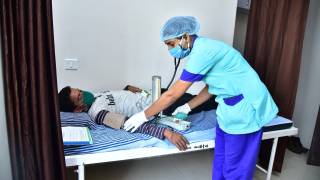Pneumococcal Vaccination May Decrease COVID-19 Cases

The Journal of Infectious Diseases recently published a study focused on whether there are interactions that occur between the SARS-CoV-2 coronavirus and Streptococcus pneumoniae.
This research published on March 9, 2021, found after adjusting for risk factors and other exposures, seniors (65+ years) who had received a 13-valent pneumococcal conjugate vaccine (PCV13) experienced a lower incidence of COVID-19 diagnosis, hospitalization, and death.
Based on data from the Kaiser Permanente Southern California healthcare system during the second quarter of 2020, the vast majority (83.4%) of the study participants have received a PCV13 vaccination.
Among the 531,033 seniors who had received the PCV13 vaccine, there were 3,677 COVID-19 cases in the study cohort that led to 1,075 hospitalizations (0.2%) and 334 related fatalities (0.06%).
However, this study found no relationship between COVID-19 risk and receipt of the 23-valent pneumococcal polysaccharide vaccine. The 23-valent pneumococcal polysaccharide vaccine, also recommended for seniors to prevent pneumococcal disease, has not been found to confer strong protection against mucosal endpoints as pneumococcal carriage and non-bacteremic pneumonia, said these researchers.
In summary, these researchers stated 'the reduced risk of COVID-19 among PCV13 recipients, transiently attenuated by antibiotic exposure, suggests pneumococci may interact with SARS-CoV-2.'
Recently, a study published by Mayo Clinic researchers also reported a strong association between pneumococcal vaccination and protection against COVID-19.
Published in the journal Nature on February 26, 2021, this exploratory study analyzed immunization records from 137,037 individuals who received SARS-CoV-2 PCR tests.
This study found that polio, Haemophilus influenzae type-B, measles-mumps-rubella, Varicella, PCV13, geriatric Flu vaccine, and hepatitis A/hepatitis B vaccines administered in the past 1, 2, and five years were associated with decreased SARS-CoV-2 infection rates.
Furthermore, age, race/ethnicity, and blood group stratified analyses reveal significantly lower SARS-CoV-2 infection rate among black individuals who have taken the PCV13 vaccine, with a relative risk of 0.45 at the five year time horizon (n: 653, 95% CI (0.32, 0.64), p-value: 6.9e−05).
‘There are prior studies highlighting mechanisms of activation of broad immune signaling pathways by vaccines, which might also be providing protection against SARS-CoV-2. This nonspecific innate response conferring protection to other infections is termed as ‘trained immunity,’ concluded this study.
The Mayo Clinic trained immunity finding may help explain why children are seldom admitted to hospitals for COVID-19.
According to the U.S. Centers for Disease Control and Prevention (CDC), the childhood vaccination rate against pneumococci, which protects against Streptococcus pneumoniae bacteria, ranges between 74% to 92%.
Although the CDC recommends that all adults 18-64 in high-risk groups for COVID-19 and all adults over the age of 65 get a pneumococcal vaccination, about 23% of high-risk adults and 64% of those over the age of 65 have been vaccinated.
In contrast to these studies, as of February 12, 2021, Harvard University’s website’s vaccine information, says ‘vaccines against pneumonia, such as pneumococcal vaccine and Hemophilus influenza type B vaccine, only help protect people from these specific bacterial infections. They do not protect against any coronavirus pneumonia, including pneumonia that may be part of COVID-19.’
Overall, the CDC recommends pneumococcal vaccination for adults 65 years or older. These seniors should receive one dose of PPSV23.
Also, the CDC says clinicians should consider PCV13 vaccinations for seniors who do not have an immunocompromising condition, cochlear implant, cerebrospinal fluid leak, and who have never received PCV13 before.
Viruses, bacteria, and fungi can all cause pneumonia, which is an infection of the lungs that can cause mild to severe illness in people of all ages. Common signs of pneumonia can include cough, fever, and trouble breathing says the CDC.
In the USA, common causes of viral pneumonia are influenza, respiratory syncytial virus, and SARS-CoV-2, the virus that causes COVID-19.
A common cause of bacterial pneumonia is Streptococcus pneumoniae (pneumococcus). However, clinicians are not always able to find out which germ caused someone to get sick with pneumonia, concludes the CDC.
The Kaiser study was funded by Pfizer, Inc., a producer of PVC13, PPSV23, and COVID-19 vaccines. Study correspondence to Joseph Lewnard, 2121 Berkeley Way, Berkeley, California 94720, United States, [email protected].
PrecisionVaccinations publishes research-based vaccine news.
Note: This article was expanded for clinical relevancy.
Our Trust Standards: Medical Advisory Committee
- Exploratory analysis of immunization records highlights decreased SARS-CoV-2 rates in individuals with recent non-COVID-19 vacci
- Preventing the spread of the coronavirus
- CDC: Pneumonia
- CDC: PCV coverage among children 19-35 months by State, HHS Region, and the United States, National Immunization Survey-Child
- CDC: Pneumococcal Vaccination: Summary of Who and When to Vaccinate
- Prevention of COVID-19 among older adults receiving pneumococcal conjugate vaccine suggests interactions

























